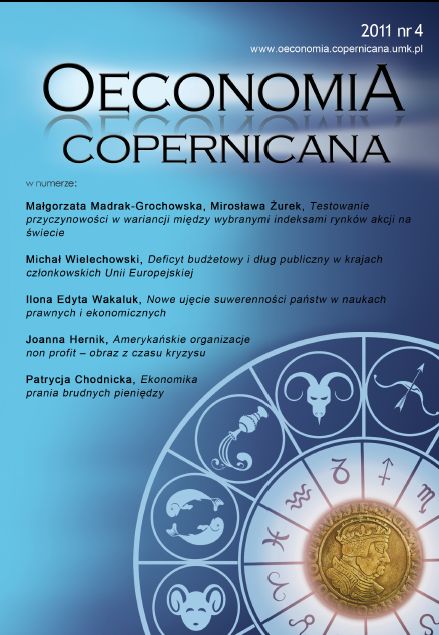GENERAL GOVERNMENT DEFICIT AND PUBLIC DEBT
DOI:
https://doi.org/10.12775/OeC.2011.016Keywords
general government deficit, public debt, excessive deficit procedure, European UnionAbstract
The aim of this article is the presentation and the attempt to analyse such phenomena as: an excessive general government deficit and public debt in EU Member States over the past 3 years. For the European Union the years 2008-2010 were the time when public finances of most member countries worsened dramatically. The average budget deficit in the EU increased during that period to a value of almost 7% compared to gross domestic product and public debt reached almost 80% of GDP. Referring the numbers to the principles of the budgetary policy in the Treaty on the European Union (the deficit should not exceed 3% in relation to GDP and public debt – 60% of GDP), the observance of budgetary discipline has been significantly violated. In consequence, the excessive deficit procedure has been initiated. in relation to almost all the countries of the EU, Its purpose was to force the member countries to take concrete actions to stabilize public finances. The economic crisis that began in the second half of 2007 in the United States of America which resulted in a significant deterioration of the finances of all the EU member countries might be regarded as the major source of violation of their budgetary discipline. The reactions of most governments TO the harmful effects caused by the financial crisis were to stimulate national economies and stem the decline of domestic demand. The higher level of public expenditures was simultaneously the cause of increased budget deficits,. To develop and present the problem of an excessive budget deficit and public debt in the EU countries some statistical methods were used and the data source statistics were mainly carried out by the European Commission and the European Statistical Office.References
Begg D., Fischer S., Dornbusch R. (2003), Makroekonomia, Polskie Wydawnictwo Ekonomiczne, Warszawa.
Chmielewski A. (1997), Raport o gospodarce. Dług publiczny, „Życie gospodarcze”, nr 9.
Chojna–Duch E. (2003), Polskie prawo finansowe. Finanse publiczne, LexisNexis, Warszawa.
Ciak J. (1997), Deficyt budżetowy – wybór czy konieczność, „Bank i Kredyt”, NBP, nr 4.
Miklaszewicz S. (2009), Deficyt budżetowy w doktrynie i praktyce integracji walutowej krajów strefy euro, SGH, Warszawa.
Gostomski E. (2010), Deficyt i zadłużenie, „Gazeta bankowa”, lipiec, nr 7-8.
Gruszecki T. (2011), Zadłużona Europa, „Gazeta Bankowa”, nr 3.
Gruszecki T. (2010), Czy świat zbankrutuje?, „Gazeta bankowa”, nr 11.
Kosek-Wojnar M., Owsiak S., Surówka K. (1995), Podstawy teorii finansów publicznych, Akademia Ekonomiczna w Krakowie, Kraków.
Krawczyk M. (2009), Deficyt budżetu państwa i aktywność gospodarcza, „Ekonomista”, nr 5.
Reinhard C., Rogoff K., (2008), This time is different: a panoramic view of Wight centuries of financial crises, „ National Bureau of Economic Research”, Cambridge, Massachusetts.
Wernik A. (2009), Równowaga finansów publicznych a euro, „Bank i Kredyt”, Vol. 40, nr 3.
AMECO – baza ekonomiczna Komisji Europejskiej, http://ec.europa.eu/economy_finance/ameco/user/serie/SelectSerie.cfm (stan na dzień 5 marca 2011 roku).
Stability and Growth Pact. Country-specific procedures, http://ec.europa.eu/economy_finance/sgp/deficit/countries/index_en.htm# , (stan na dzień 5 marca 2011 roku).
Ustawa z dnia 30 czerwca 2005 r. o finansach publicznych, Dz.U. z 2005 r. Nr 249, poz. 2104.
Wersja skonsolidowana Traktatu o funkcjonowaniu Unii Europejskiej (2008), Dz.Urz. UE C 115, 9 maja 2008 r., http://eur-lex.europa.eu/LexUriServ/LexUriServ.do?uri=OJ:C:2010:083:0047:0200:PL:PDF (stan na dzień 5 marca 2011 roku).
Downloads
Published
How to Cite
Issue
Section
Stats
Number of views and downloads: 999
Number of citations: 0



